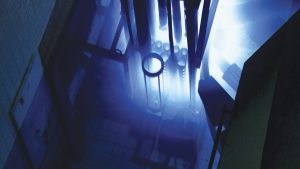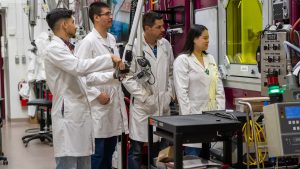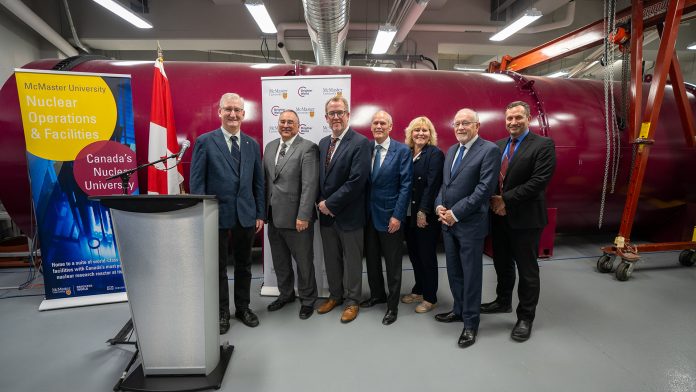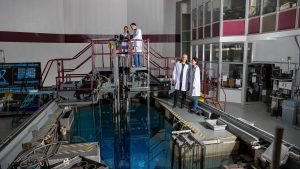McMaster is Canada’s Nuclear University – home to a suite of nuclear research facilities and experts advancing innovation in medical isotopes, clean energy, materials science and more.
Located in Hamilton, the third largest city in Ontario, McMaster University is among Canada’s most research-intensive universities and the nation’s preeminent academic nuclear research institution. The McMaster campus houses a unique suite of world-class nuclear research facilities anchored by the McMaster Nuclear Reactor (MNR) – a multi-purpose research reactor that provides neutrons for medical isotope production and scientific research.
McMaster University’s nuclear research facilities enable discoveries in medicine, clean energy, nuclear safety, materials and environmental science, while providing cancer treatments for more than 70,000 patients every year.
Facilities and services include:
- McMaster Nuclear Reactor (MNR): Medium flux reactor with an open-pool design providing ready access to the reactor core for irradiation experiments.
- Centre for Advanced Nuclear Systems (CANS): Post irradiation examination facility consisting of a series of five connected hot cells designed for receiving, machining, testing and analysis of materials.
- High-Level Laboratory Facility (HLLF): For radiochemistry and other work with open sources of radioactive materials.
- McMaster University Cyclotron Facility (MUCF): A 16 MeV cyclotron and hot cell suite for generating proton-rich radioisotopes.
- McMaster Accelerator Laboratory (MAL): A 1.25 MV Tandetron accelerator, a general-use KN accelerator, and lab space.
- Canadian Neutron Beam Laboratory (CNBL): A national neutron beam user facility with five beamlines in operation and under construction.
- Additional research stations: Neutron activation analysis, neutron diffraction, neutron radiography, small-angle neutron scattering, positron annihilation spectroscopy.

Producing life-saving medicines
McMaster is a world-leading supplier of two medical isotopes – iodine-125 and holmium-166. In addition to supplying these life-saving medicines to patients around the world, McMaster collaborates with academic and industry partners on the research and development of new radioisotope-based treatments, leveraging on-campus expertise and facilities, like the McMaster Nuclear Reactor and the McMaster University Cyclotron Facility (MUCF).
Researchers at McMaster are advancing groundbreaking discoveries in the fields of nuclear medicine and molecular imaging. Our experts include:
- Sam Sadeghi, an associate professor in the Department of Chemistry and Chemical Biology, is advancing the discovery, preclinical validation and clinical translation of molecular imaging agents and targeted radiotherapeutics to treat cancer.
- James Inkster, an assistant professor in the Department of Chemistry and Chemical Biology, is focused on the discovery of innovative and broadly useful radiolabeling and radio-bioconjugate strategies, which he has leveraged to develop PET radiotracers for imaging cancer, cardiovascular disease and Parkinsonian disorders.
- Jonathan Bramson, a professor in the Department of Pathology and Molecular Medicine, is focused on developing methods to direct cancer patients’ immune systems to attack their tumours. Currently, his lab is using synthetic biology methods to direct T cells against discrete tumour targets.
- Katherine Zukotynski, a professor in the departments of Medical Imaging and Medicine, studies dementia, prostate cancer and AI with an emphasis on nuclear medicine, molecular imaging and associated therapies.
The nuclear-enabled McMaster Innovation Park (MIP) supports activities along the entire radiopharmaceutical innovation chain. Headquartered at MIP, biotech company Fusion Pharmaceuticals – founded by McMaster chemistry professor John Valliant and recently acquired by AstraZeneca for $2bn – is dedicated to improving the lives of cancer patients with the development of next-generation radioconjugates as precision medicine.
Advancing clean energy solutions
McMaster has a strong tradition of work in environmental science and nuclear energy. A key resource for Canada’s nuclear energy sector, McMaster performs testing and analysis on nuclear power plant components. The university is also driving research and training in small modular reactors (SMRs) – a clean and reliable source of nuclear energy and a critical technology in the fight against climate change. Facilities like the Centre for Advanced Nuclear Systems (CANS) and research institutes like the McMaster Institute for Energy Studies (MIES) facilitate innovations in nuclear energy, materials, safety and storage.

including in-service components from nuclear power reactors
McMaster researchers pioneering clean energy solutions include:
- Dave Novog, a professor in the Department of Engineering physics, is a world-renowned expert in nuclear safety. Novog is spearheading research on SMR fuel performance and leads the Small Modular Advanced Reactor Training (SMART) programme.
- James Cotton, a professor in the Department of Mechanical Engineering, is a leading expert in the emerging field of thermal energy recovery, storage, and management, and leads McMaster’s Integrated Community Energy and Harvesting (ICE-Harvest) project.
- Keena Trowell, a professor in the Department of Mechanical Engineering, is examining metal-water reactions as a promising way of reducing greenhouse gas emissions while powering remote communities with renewable energy.
- Joey Kish, a professor in the Department of Materials Science and Engineering, leads a team at McMaster engaging in applied research to enhance structural materials performance in SMRs.
Securing the future of neutron beam science
McMaster’s nuclear facilities, combined with other on-campus resources like the Brockhouse Institute for Materials Research, have positioned the university as a world leader in neutron scattering and materials characterisation.
With investments from the Canada Foundation for Innovation and six provincial governments, McMaster and Neutrons Canada have launched the Canadian Neutron Beam Laboratory (CNBL) – a new suite of facilities at McMaster designed to advance neutron beam research in Canada. The CNBL will construct a new guide-hall, two new beamlines and three new neutron beam instruments to meet the needs of the materials research community and advance discoveries in clean energy, superconductors, advanced manufacturing, biomaterials and quantum materials.
Materials science experts at McMaster include:
- Bruce Gaulin, a professor in the Department of Physics & Astronomy, is an experimental condensed matter physicist, working in the general area of scattering studies of exotic ground states in new, mostly magnetic, materials.
- Pat Clancy, an assistant professor in the Department of Physics & Astronomy, studies the structural, magnetic, and electronic properties of novel materials using complementary X-ray and neutron scattering techniques.
- Andy Knights and Peter Mascher, engineering physics professors, have established a positron beamline used to characterise materials at the nano-scale – an essential tool for developing next-generation semiconductors, photonics, and advanced communications technologies.
Building the nuclear workforce of tomorrow
McMaster is dedicated to preparing young engineers, scientists and healthcare leaders for careers in the evolving nuclear industry. With over 60 course offerings focused on nuclear chemistry, technologies, medicine, radiation studies, environmental protection and more, students can gain a wide range of knowledge, skills, and experience that sets them up for success in their professional pathways. Plus, our industry connections mean students can interact with leading companies and academic institutions in nuclear through networking opportunities, sector-specific learning programmes, and collaborative research projects with nuclear experts from around the world.
McMaster is proud to be launching the Minor in Nuclear Studies and Society in September 2025 – a new programme designed to equip undergraduate students with knowledge and skills to tackle critical challenges and opportunities in nuclear.
Please note, this article will also appear in the 22nd edition of our quarterly publication.










